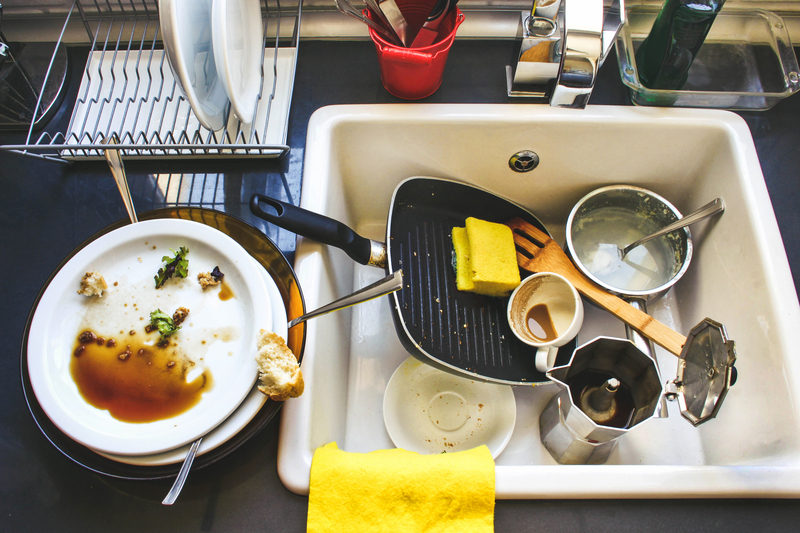Get Organized: Decluttering Your Space Before Moving Day
Are you preparing to move? Discover the ultimate guide to organizing, sorting, and decluttering your space before moving day!
Why Decluttering Before Moving is Essential
The process of moving to a new home can be overwhelming, but it doesn't have to be. One of the best ways to reduce stress and simplify the moving experience is to get organized and declutter your home before moving day arrives. Decluttering before a move has several benefits:
- Reduces the amount of items you need to pack, saving time and packing supplies.
- Helps you start fresh in your new home with only the possessions you truly value.
- Decreases moving costs, since most moving companies charge by weight or number of boxes.
- Allows you to properly organize and inventory your belongings, ensuring nothing gets lost or left behind.
- Offers an opportunity to sell, donate, or recycle items you no longer need--benefiting the environment and those in need.
Preparing for Your Decluttering Journey
Before you dive into decluttering your space for a move, it pays to get prepared. Follow these tips to maximize efficiency and minimize stress:
- Create a Moving Timeline: Start planning at least 4-8 weeks before your move. Block out time on your calendar for decluttering sessions.
- Gather Supplies: You'll need boxes, trash bags, markers, labels, and cleaning products.
- Recruit Help: Enlist family and friends or consider hiring professionals to help with organizing and hauling away unwanted items.
- Set Realistic Goals: Try not to declutter your entire home in a single day. Break the process into manageable chunks.

Room-by-Room Decluttering Strategies
Tackling one room at a time is the most effective method when cleaning out your home before moving day. Here's how you can approach each area:
Living Room
- Sort through books, magazines, and media. Donate or recycle those you no longer want.
- Inspect furniture for wear, damage, or redundancy. Sell, donate, or discard pieces you won't need or that won't fit in your new home.
- Organize knick-knacks and decorative items. Keep only what has sentimental or aesthetic value.
- Check electronics and cords. Safely dispose of non-working items at e-waste centers.
Kitchen
- Empty cupboards and pantry. Discard expired food, and donate unopened non-perishables.
- Sort utensils, gadgets, and cookware. Keep only what you use regularly.
- Check appliances. If you have older, redundant, or broken appliances, consider recycling or donating them.
- Evaluate plates, glassware, and storage containers. Donate duplicates or mismatched items.
Bedrooms
- Go through clothing and shoes. Donate, sell, or recycle anything that no longer fits, is out of style, or unneeded for your climate.
- Empty dresser drawers and closets. Be honest about what you truly wear and need.
- Sort through bedding and linens. Toss or repurpose old or worn-out items.
- Check under the bed and inside storage bins for forgotten items.
Bathroom
- Discard expired medications, makeup, and personal care products.
- Organize towels. Donate extras to shelters or animal organizations.
- Minimize duplicates of items like razors, brushes, or soaps.
Garage, Basement, and Attic
- Sort tools, outdoor gear, and sports equipment. Sell or donate duplicates or items you rarely use.
- Properly dispose of chemicals, paint, or hazardous waste following local regulations.
- Evaluate holiday decor and long-stored items. Let go of anything broken, outdated, or no longer meaningful.
Home Office
- Purge paperwork, remembering to shred sensitive documents you no longer need.
- Declutter books, old tech, and office supplies.
- Archive important records digitally where possible for a streamlined move.
Sorting: Keep, Donate, Sell, or Toss
As you go through your belongings, it's helpful to clearly categorize items into four main groups:
- Keep: Essential items you use and love, ready to go to your new home.
- Donate: Gently used items that could benefit a charity or person in need.
- Sell: Items of value you no longer want, such as furniture, electronics, or collectibles. Use online marketplaces or hold a garage sale.
- Toss: Broken, outdated, or unusable items. Recycle responsibly whenever possible.
Label boxes or bags for each category and immediately move items out of your home as you decide. This prevents reconsidering and re-cluttering spaces you've already organized.
How to Decide What to Let Go Of
If you're struggling to part with things, ask yourself:
- Have I used this in the last year?
- Is this worth the cost and effort of moving?
- Do I have a similar item that does the same job?
- Would someone else benefit from this more than me?
- Does it have true sentimental value, or is it just "stuff"?
Packing Tips for an Organized Move
Once you've decluttered, packing becomes much easier and quicker. Here are some expert packing tips to stay organized:
- Label Everything Clearly: Mark boxes with their room destination and contents for painless unpacking.
- Pack by Room: Keep items from the same room packed together.
- Use Moving Inventory Lists: Maintain a spreadsheet or checklist. It'll help track what's in each box.
- Protect Fragile Items: Use towels, clothing, or bubble wrap to cushion breakables. Write "fragile" on boxes that need special care.
- Keep Essentials Out: Pack a suitcase or box with moving day essentials like toiletries, chargers, important documents, and a few days' worth of clothes.
Resources for Donating and Selling Unwanted Items
Wondering where to take your items after clearing out your space in preparation for a move? Here are some options:
- Donation Centers: Goodwill, Salvation Army, Habitat for Humanity ReStores, or local shelters.
- Online Marketplaces: Craigslist, Facebook Marketplace, eBay, OfferUp.
- Consignment Shops: For higher-end clothing or furniture items.
- Community Groups: Freecycle or Buy Nothing Project for giving items away locally.
- Specialty Recyclers: Electronics, paint, and hazardous material recycling locations.
Digital Decluttering: Don't Forget Your Data!
Physical clutter isn't all you need to worry about. Before moving, make time to:
- Clear unwanted files, duplicates, or outdated documents from your devices.
- Back up important data: use cloud storage or an external hard drive.
- Delete old apps or programs you no longer use.
- Organize digital photos; print your favorites or put them on a dedicated thumb drive.
Tips for Staying Motivated During the Decluttering Process
Decluttering before moving day can be emotional and tiring, but with the right strategies, you'll stay motivated and finish strong:
- Start Small: Begin with a single drawer or shelf to build momentum.
- Set Timers: Work in focused blocks of 15-30 minutes to avoid burnout.
- Reward Yourself: Treat yourself after completing a room or major task.
- Remember Your Goal: Visualize your new, clutter-free home to stay inspired.
- Invite a Friend: Having a buddy can make sorting and decision-making easier and more enjoyable.
Common Decluttering Mistakes to Avoid Before Moving
- Leaving It Until the Last Minute: Decluttering under pressure leads to poor decisions and extra stress.
- Trying to Tackle Everything Alone: Don't hesitate to ask for help; professional organizers can be a wise investment.
- Being Too Sentimental: While it's okay to keep a few mementos, don't let nostalgia cloud judgment over keeping clutter.
- Not Having a Plan for Discarded Items: Organize pickups or drop-offs for unwanted items ASAP to avoid re-cluttering your space.
Benefits of an Organized Space Upon Arrival
Your efforts to declutter before moving will truly pay off when you arrive at your new home. You'll enjoy:
- An easier, faster unpacking process.
- Less stress and a feeling of accomplishment.
- A tidy, welcoming new environment free from excess clutter.
- More space for new memories and future growth.
- Improved mental clarity and focus in your new surroundings.

Frequently Asked Questions on Getting Organized Before Moving Day
How far in advance should I start decluttering for a move?
It's recommended to begin the decluttering and organizing process at least 4-8 weeks before your scheduled move. This gives plenty of time to sort, sell or donate items, and not feel rushed.
Should I hire a professional organizer to help me?
If you're facing a tight deadline, have a large home, or simply feel overwhelmed, hiring a professional can be a smart decision. Their expertise can help you sort efficiently and stay on track.
What should I do with sentimental items I can't part with?
Designate a specific box or container for meaningful keepsakes. Limit yourself to items that truly bring you joy or represent special memories. For bulky sentimental belongings, consider taking photos to preserve the memory without keeping the object itself.
How do I get rid of furniture or large items before moving day?
Offer them to friends and family, list on local online marketplaces, or schedule a pickup with donation centers or junk removal services. If in good condition, many organizations will pick up for free.
Conclusion: Your First Step to Stress-Free Moving
Getting organized and decluttering before moving day is the best way to lay the foundation for a peaceful, successful move. By prioritizing what matters, letting go of the excess, and staying systematic in your approach, you'll make moving out--and moving in--far easier.
Remember: The sooner you start the process, the smoother your transition will be. So, pick up some boxes, put on your favorite playlist, and begin the journey toward a clutter-free new beginning. Your future self will thank you!
If you found this guide on decluttering your home before moving day helpful, be sure to bookmark and share it with others who are preparing for a move. Happy decluttering and happy moving!



